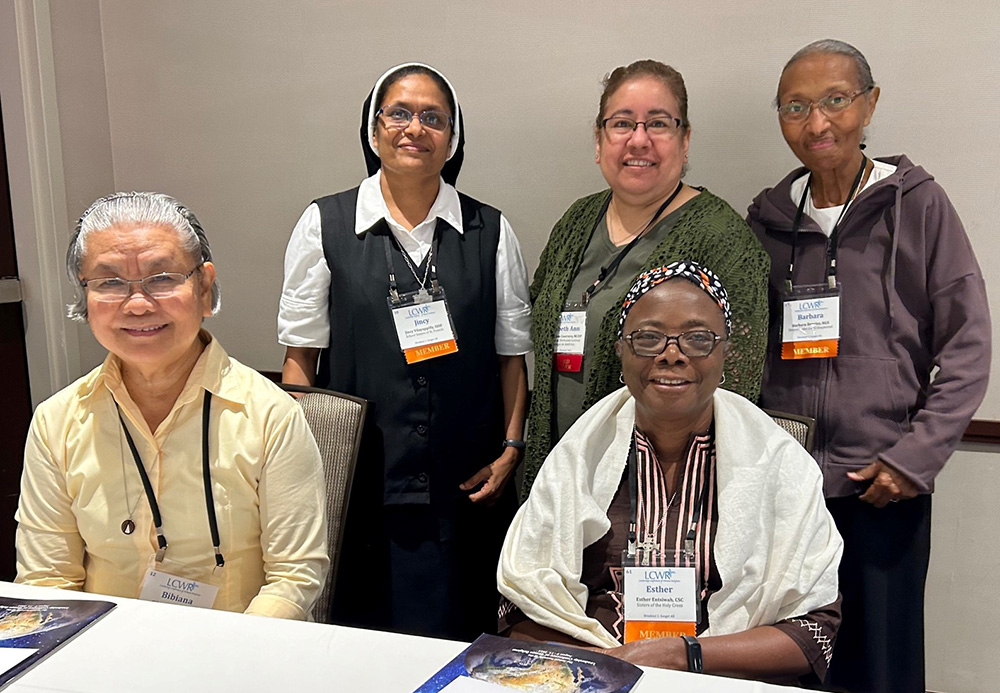
Panelists for the morning session on intercultural leadership at the 2023 Leadership Conference of Women Religious assembly in Dallas: seated, Dominican Sr. Bibiana Colasito and Holy Cross Sr. Esther Adjoa Entsiwah; standing, Franciscan Sr. Jincy Vilayappilly, Missionary Catechist of Divine Providence Sr. Elizabeth Ann Guerrero (facilitator), and Good Shepherd Sr. Barbara Beasley (Courtesy of Annmarie Sanders)
Senegalese poet, forestry engineer and environmentalist Baba Dioum once spoke these words: "In the end, we will conserve only what we love, we will love only what we understand, and we will understand only what we were taught." These enduring words, spoken in 1968 in New Delhi at the General Assembly of the International Union for the Conservation of Nature, hold a timeless truth that still resounds through the ages.
Dioum's wisdom resonated deeply during my participation in a session on intercultural leadership at the Leadership Conference of Women Religious assembly in Dallas. The breakout session offered a profound exploration of the diverse experiences and perspectives that shape leadership within many religious communities today. Panelists from India, Ghana, the Philippines, Puerto Rico, Kenya, the United States and the Dominican Republic shared personal stories that went beyond cultural boundaries.
As I immersed myself in these narratives, a central theme emerged: the complex interconnectedness of culture, identity and leadership.
Sr. Jincy Vilayappily, a School Sister of St. Francis from India, offered an insight into the complexity of leadership within a hierarchical and male-dominated context. Her experience illustrated the challenges and opportunities within traditional leadership structures while trying to bring about meaningful change.
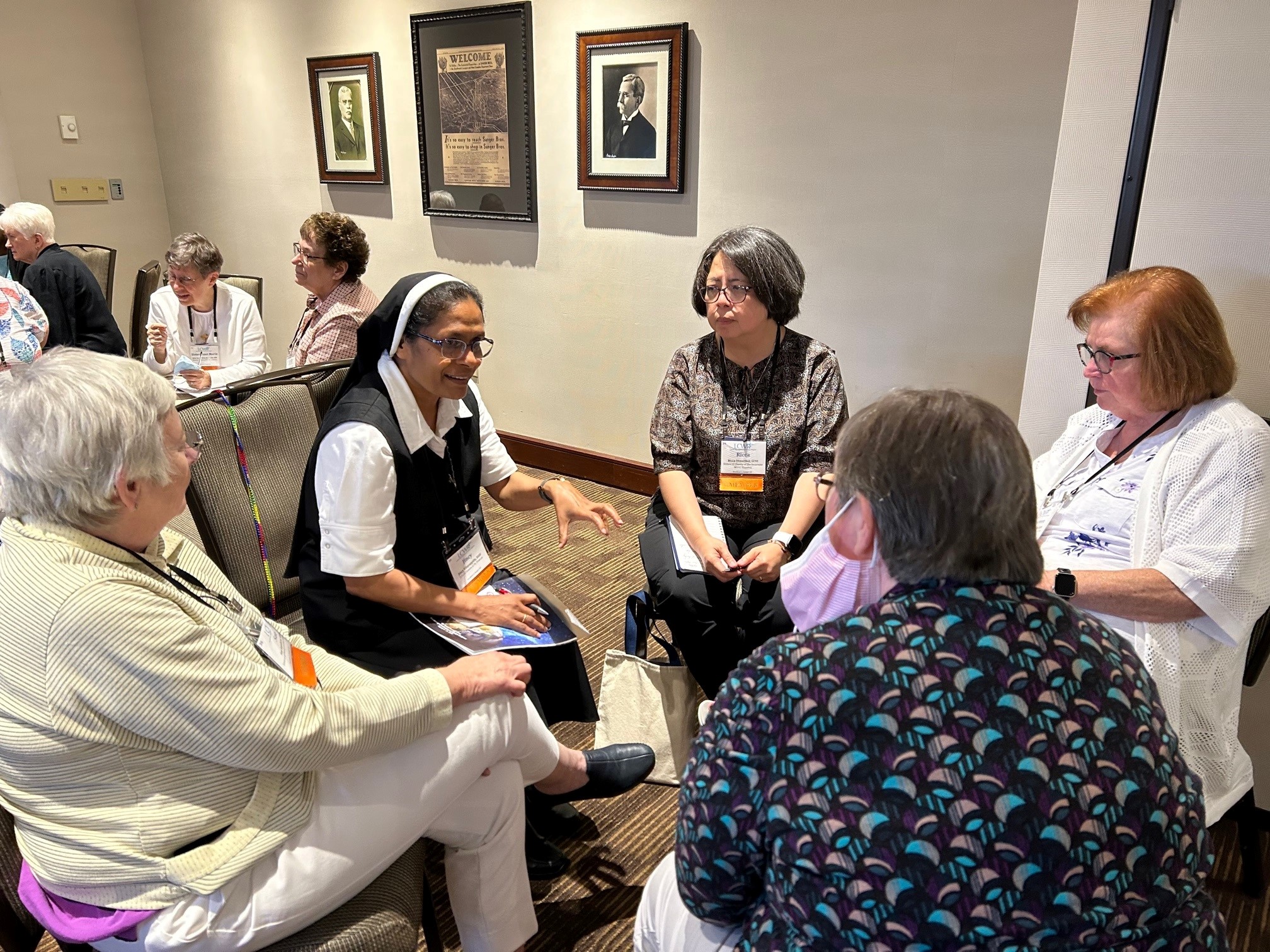
A roundtable discussion during the breakout session on intercultural leadership at the 2023 LCWR assembly in Dallas (Courtesy of Annmarie Sanders)
Her description of leadership in the church and religious community, characterized by authoritarian monitoring and genuine love and care, highlighted the paradoxical nature of such environments. What resonated deeply with me was Sister Jincy's ability to embrace the duality of her experience, recognizing both the gifts and challenges of her leadership journey.
Her recognition of her capacity to contribute to decision-making by bringing cultural perspectives to the table highlights the value of diverse viewpoints. Her openness to others' perspectives and her desire to understand and respect individual differences was a testament to her commitment to fostering genuine connections. Her ability to immerse herself in other cultures, exemplified by her time at the Catholic Theological Union in Chicago, showed her innate ability to inculturate and integrate diverse experiences into her leadership style.
However, Sister Jincy acknowledged that challenges exist.
Communication barriers, hierarchical and circular leadership styles, and nuances require sensitivity and adaptability. Sister Jincy's approach of being respectful, seeking clarity, and fostering open discussions when needed was a great example of how to lead effectively across cultural boundaries.
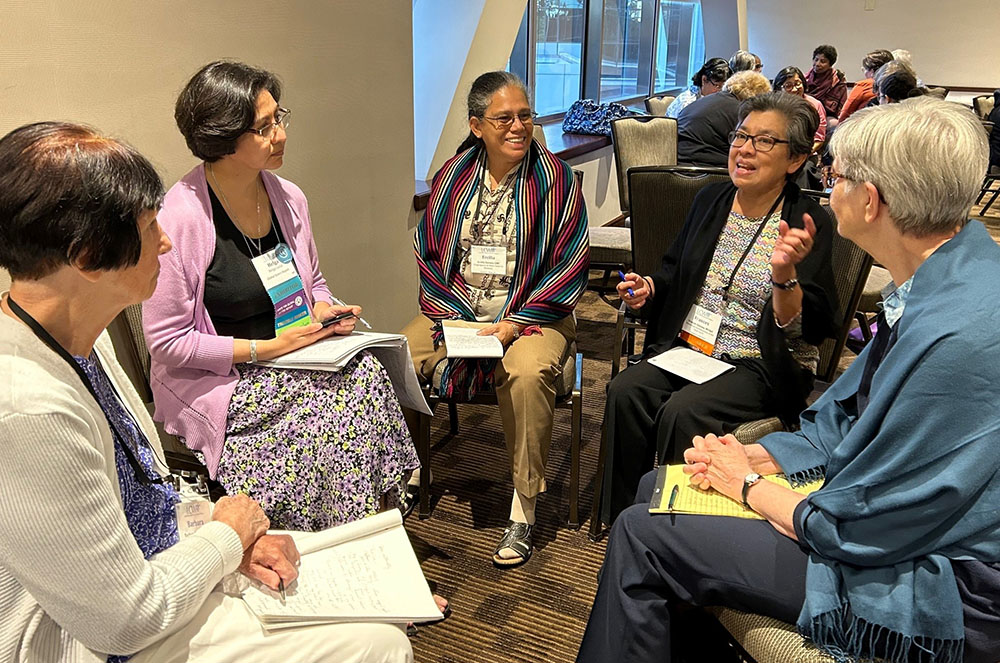
A roundtable discussion during the breakout session on intercultural leadership at the 2023 LCWR assembly in Dallas (Courtesy of Annmarie Sanders)
The story of Sr. Bibiana Colasito's journey to leadership in the Adrian Dominicans is closely tied to the complex history of colonization in the Philippines. The legacy of this history is visible in the persistent use of labels such as "indios"and "criollos" that reflect deep-seated prejudices and shape historical identities.
Despite her initial reluctance to take on leadership roles due to these associations, Sister Bibiana has persevered and overcome the scars left by colonization. As a Latina woman, I found her story both powerful and difficult to hear.
Sister Bibiana's unwavering belief in equality for all, regardless of their diverse upbringings, is a testament to the strength of the human spirit to transcend adversities. Despite the obstacles in her personal history, she challenges the prevailing notion that an individual's worth and capabilities are determined by their background. Instead, she emphasizes the intrinsic value of every person.
She highlighted the significance of recognizing and addressing cultural differences while simultaneously challenging them. This call for acknowledgment emphasizes the importance of honoring cultural diversity while confronting norms that sustain inequality. Sister Bibiana's transformation from being labeled an "india" to embracing her identity as a proud Filipina underscores a personal transformation of self-discovery and empowerment.
Leadership, regardless of cultural context, requires the strength to confront challenges and uncertainties while remaining committed to serving others.
Sr. Esther Adjoa Ensiwah, born in Ghana, and now a leader in the Sisters of the Holy Cross congregation in Indiana, provided valuable insights into the intricate connection among culture, leadership and service. Her origins in the Akan tribe, known for its communication through stories and proverbs, illuminate a unique leadership approach that centers on the community's well-being.
Sister Esther's depiction of leadership within the Akan culture unveiled a progressive path of growth and development. Rooted in apprenticeships and early relationship-building, this culture imparts not only practical skills but also the significance of nurturing connections.
In contrast to conventional hierarchical leadership models, Sister Esther underscored the communal decision-making characteristic of Akan leadership. The image of gender-inclusive dialogues at the chief's residence, designed to prioritize the common good, highlights collaboration and equitable participation. This strengthens the idea that leadership flourishes when founded on shared responsibilities and diverse viewpoints.
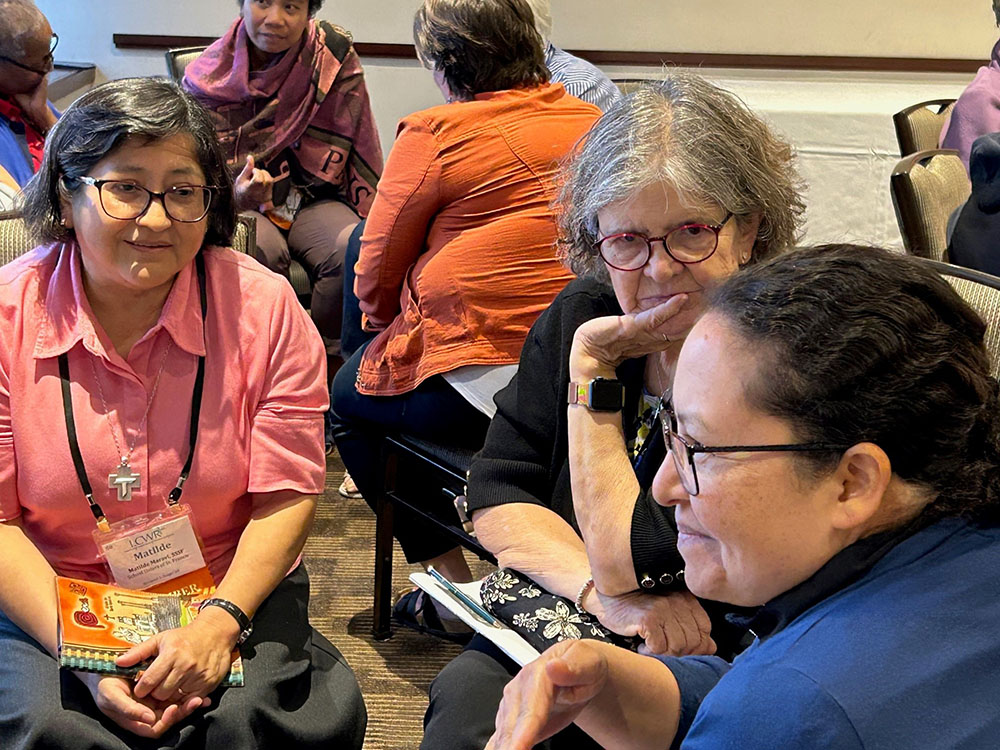
A roundtable discussion during the breakout session on intercultural leadership at the 2023 LCWR assembly in Dallas (Courtesy of Annmarie Sanders)
Sister Esther's perspective also underscores the crucial connection between leadership and courage. The importance of having the courage to navigate the complexities of guiding a community and making decisions for the greater good was loud and clear.
Her story serves as a reminder that leadership, regardless of cultural context, requires the strength to confront challenges and uncertainties while remaining committed to serving others.
The accumulated wisdom of Sr. Barbara Beasley, gathered over six decades in religious life, spoke to the evolving nature of leadership. Her experience as a Sister of the Good Shepherd, viewed from an African American perspective, paints a vibrant picture of leadership, resilience and shared growth.
As the landscape of leadership has evolved, she has remained steadfast in her principles while gracefully adapting to new approaches. Her unwavering determination has enabled her not only to endure but to thrive in a constantly changing environment.
Advertisement
Sister Barbara's character is defined by qualities such as perseverance, grit, responsibility and courage.
Sister Barbara spoke of a deep sense of responsibility. She invited the audience to have the courage to confront adversity and to show up, even in the face of discomfort. This courage and her commitment to collaboration testify to her wisdom.
The African adage she mentioned, "If you want to go fast, go alone. If you want to go far, go together," illustrates a universal truth about leadership: Strength arises from unity and shared purpose.
Sister Barbara's perspective on sharing gifts is rooted in humility and mutual respect, rather than competition. In a world where rivalry is prevalent, she encouraged us to embrace each other's strengths and work together. She reminded us that while individual achievements are admirable, it is through collective efforts that we can make a lasting impact and meaningful progress.
The afternoon session delved deeper into the intricacies of intercultural community building.
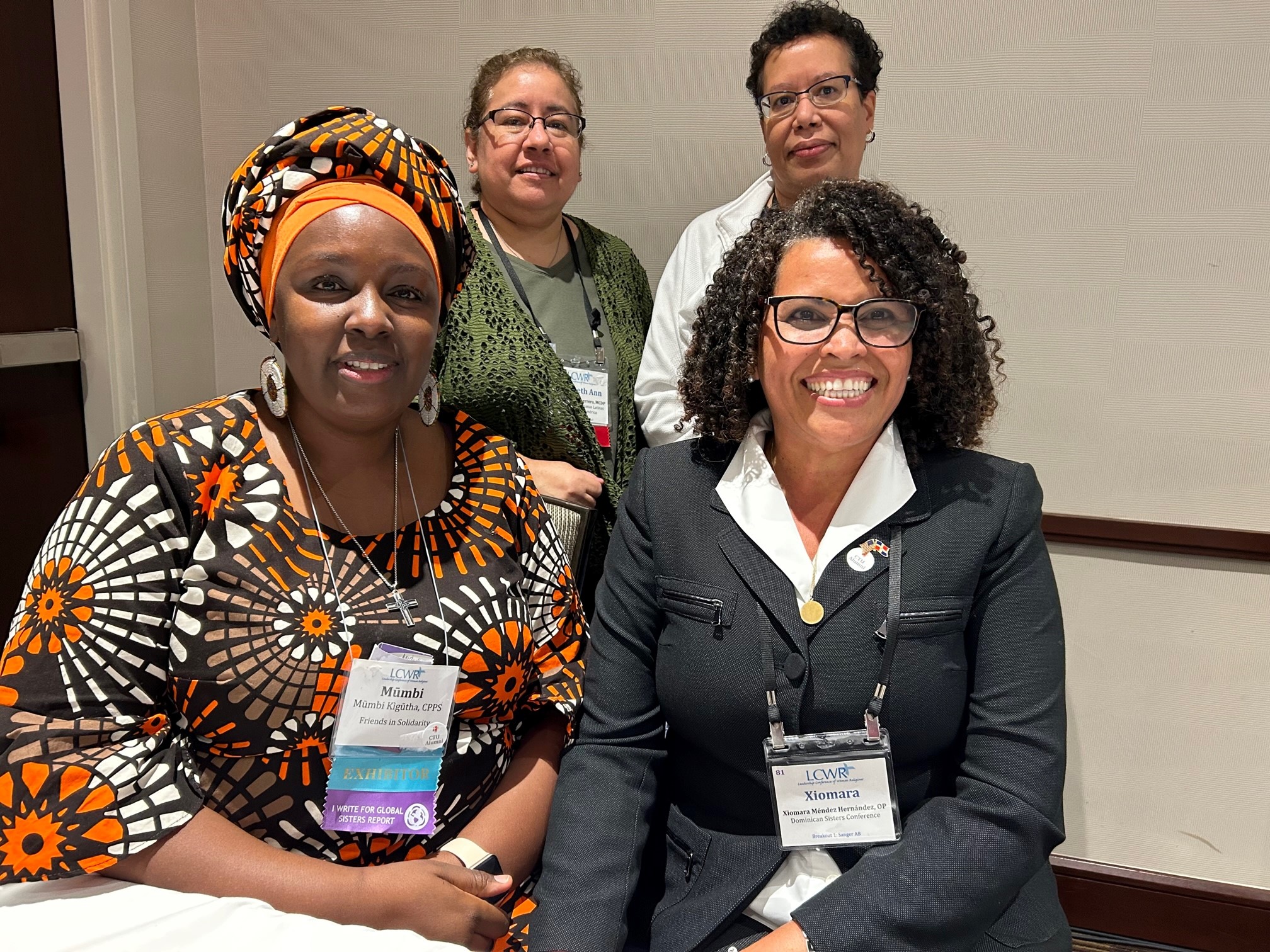
Panelists for the afternoon session on intercultural leadership: seated, Precious Blood Sr. Mumbi Kigutha and Dominican Sr. Xiomara Méndez-Hernández; standing, Missionary Catechist of Divine Providence Sr. Elizabeth Ann Guerrero and Mercy Sr. Ivette Diaz (Courtesy of Annmarie Sanders)
Sr. Ivette Diaz's connection between interculturality and the persistent issue of racism was a stark reminder that while we strive for cultural integration, we cannot ignore the shadow of discrimination that often accompanies such conversations.
Listening to Sister Ivette's journey, particularly her experience as a Puerto Rican woman entering the Sisters of Mercy, deeply touched my heart. Her upbringing in the projects of New York and her role as the first Latina woman in her local order underscored the importance of representation and a support system. The recognition she found among fellow Latina sisters gave her a sense of validation, a feeling of being understood.
Her realization that her challenges transcended mere surface-level disparities like food and language also resonated. She explained how the differences went deeper into the essence of cultural identity, including aspects like music preferences, communication styles, and deeply ingrained self-perceptions.
Sister Ivette's call for understanding and appreciation of the individuality within the Latino community struck me as a plea for recognizing the uniqueness of each person's background and experiences.
While we strive for cultural integration, we cannot ignore the shadow of discrimination that often accompanies such conversations.
She spoke of the need to move from assimilation to inculturation. She explained it as a shift from merely conforming to a dominant culture to embracing and celebrating one's heritage while integrating it harmoniously with the broader context. The example of Sister Ivette's final vows, where she and her community took a step toward true inculturation by involving her family's language and traditions, highlighted the beauty of this approach.
Sr. Xiomara Méndez-Hernández helped me to ponder the profound impact of history and personal experiences on our identities and perceptions. Hailing from the Dominican Republic as a Dominican Sister, Sister Xiomara's journey into religious life unfolded within the landscape of a nation marked by colonization and complex historical events.
Growing up in the aftermath of the U.S. invasion and the Dominican Revolution, she was keenly aware of the significant changes taking place during her formative years. These experiences shaped her understanding of justice, leading her to challenge societal norms and how individuals were treated.
As a fellow Latina, what resonated profoundly with me was her transition to the U.S., a shift from her birthplace to a country brimming with diversity yet laden with assumptions and stereotypes. Her background as a fashion designer and fashion teacher once provided her with privilege in the Dominican Republic, along with her lighter skin, but she soon realized that her privilege did not translate the same way in the U.S.
This stark realization spoke volumes about the complexities of identity and how perceptions can differ across cultures.
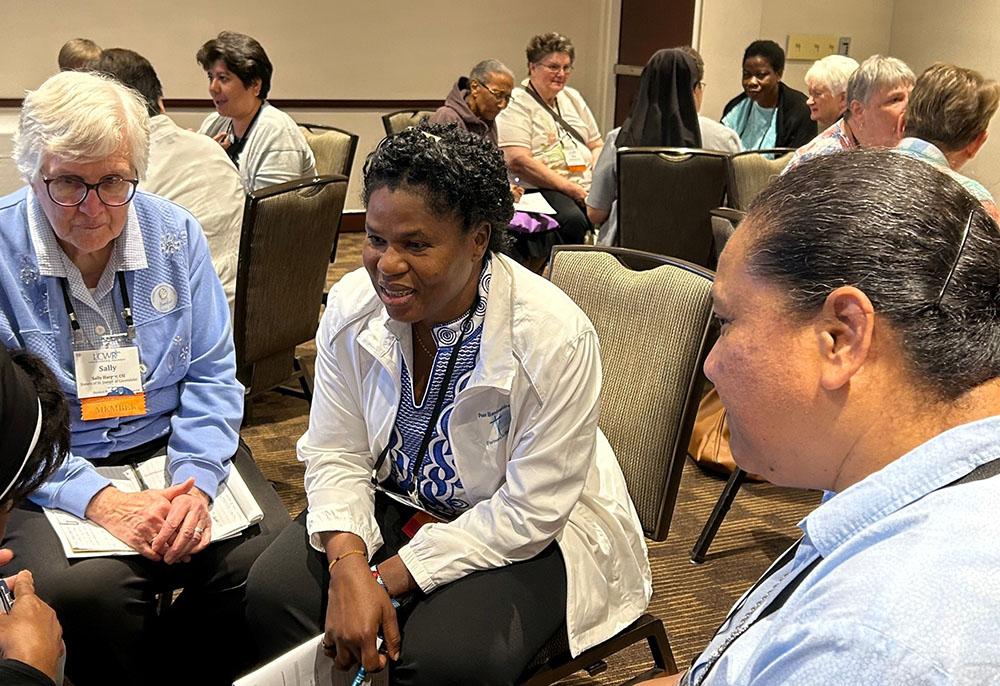
A roundtable discussion during the breakout session on intercultural leadership at the 2023 LCWR assembly in Dallas (Courtesy of Annmarie Sanders)
Despite her intention to embrace her role as a missionary to the U.S., contributing positively to the nation, she could not escape the persistent label of "immigrant" assigned by others. Labels serve as a reminder of the prevailing judgments based on appearance and cultural background.
Sr. Mumbi Kigutha's journey as a sister of the Precious Blood spoke volumes about the complexities of identity, understanding and advocacy. Being the first African sister and the second Black woman to enter and remain within her order, her story highlights the power of relationships and the challenges of navigating different cultures.
Sister Mumbi emphasized relationships based on equal footing. Her appreciation for sisters who approached her with healthy curiosity, genuinely wanting to understand her dreams and motivations, illustrated the transformative potential of respectful and empathetic interactions.
The concept of unhealthy curiosity is a powerful reminder of the harm that stereotypes and preconceived notions can cause. When questions are asked solely to confirm assumptions rather than to get to know someone genuinely, it perpetuates harmful biases and misunderstandings.
I am invited to seek deeper connections beyond surface-level differences. It is a call to foster environments where every individual's unique story is valued and celebrated.
Her struggle with understanding and deciphering roundabout, ambiguous or evasive communication, or what she calls "verbal gymnastics," illustrated the intricate layers of understanding that could sometimes be elusive in cross-cultural interactions.
Sister Mumbi's experience in her order of being "othered" as an African highlighted the tendency to attribute differences to culture when, in fact, they might be rooted in individual personality traits.
Her commitment to advocacy, aptly called "holy anger," showcased her determination to pave the way for others who would follow her path. This sense of responsibility underscored the importance of solidarity and creating an environment of inclusivity.
She also calls for access to therapy and spiritual direction for young members, recognizing the holistic well-being of individuals and acknowledging the emotional and psychological challenges that may arise, especially when navigating diverse and demanding contexts.
Sister Mumbi's struggle with emotional expression and defining her relationship with God as a Black woman spoke to the transformative nature of self-discovery within the realm of faith and spirituality.
Intercultural leadership is more than just understanding others; it also requires a willingness to learn, evolve and adapt.
Reflecting on Sister Mumbi's journey, I am reminded of the importance of active listening, empathy and advocacy in creating spaces that honor diverse experiences. Her story encourages me to continually question my assumptions because, as a Latina woman, I also have assumptions about dominant cultures.
I am invited to seek deeper connections beyond surface-level differences. It is a call to foster environments where every individual's unique story is valued and celebrated.
As the session ended, a resounding message emerged: Effective intercultural leadership requires self-awareness, respect, curiosity and patience. Intercultural leadership is more than just understanding others; it also requires a willingness to learn, evolve and adapt.
Just as Dioum's words remind us, the harmony we create through our love, understanding and the lessons we learn has the power to connect cultures and generations. In a world that aches for unity, intercultural leadership shines as a bright light, illuminating the path toward a more interconnected and harmonious future.





